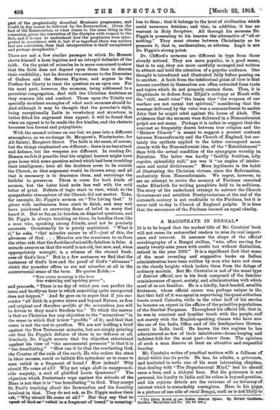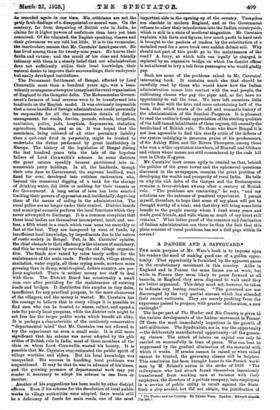A MAGISTRATE IN BENGAL.*
IT is to be hoped that the modest' title of Mr. Carstairs'hoOk. will not cause its untravelled readers to miss its real' import-' aaice and- 'interest. It assumes- the shape of the official' autobiography of a Bengal civilian, "who, after serving for nearly twenty-nine.years with credit but without distinotion, retired in the year 1903." It is a significant fact 'that- some of the most revealing' and suggestive books on Indian administration have been-written by men who have not risen'. tb the cloudy heights which isolate them from the doings of ordinary Mortals. But Mr: Carstairs is not of the usual type of district official; nor is his book composed of the fithiliar. reminiscences of sport; society.; and adinihistretion with whieli, most of us are familiar. He is a kindly, harclAieaded; sensible, Scotsman, whose official career wine perhaps unique:in, the ' fact. that half of it was spentin supervising thetenesi-stiberbart tracts round Calcutta, while in the other half of his service he became an expert in the affairs of the primitive pciplilations of the Sonthal'Parganas. Throughout his official life, that.is; he was in constant and' familiar touch with the 'pee*, and not merely with the English-speaking claims who have now the ear of the India Office and of the headquarters Govern:. ments in India itself. ' He knows the two regions he has administered as few of ' their inhabitants—home-keeping. and; indolent folk for the meet part—know them. 'The opinions, of such a man deserve 'at least an attentive and' respectful; 'heating. Mr. Cersteirs writes ofenneficaltriatters with a fullness. of detail which has-its perils. He has, he admits, a grievance,: and hesitated to write one of his moat interesting chapters,, that dealing with "The Departmental M'ind," lest lie should: seem a bore, and a dielOyal 'bore. Biat his 'grievance is not personal, hie-loyalty to 'India and its rulers is beyondceneation,. and his copious details are the Outcome of an intimacy of . interest which is-remarkably eontegiOns. Here In 'hie pages; is a picture Oforte vide- of rural 'bengal,' such E ie is tot likelk to (Witer. By. Boberk'esritiths:, .1te aecorded 'again ,in our Ulna His oritichuns are not.the -*thy fault-findings of ,a disappointedor soured man. On the eiontrary, far from despairing of British rule in India, he 'claims for it higher-powers of usefulness than have yet been .eoneeived. Of the educated, the English-speaking,-classes and *their grievances we are told but little. It is to the vernacular, the inarticulate, masses that Mr. Carstairs' heart:goes out. He iisalived among them for twenty-nine years. He knows their faults and virtues ; and the result of his close and friendly intimacy with them is a sturdy belief, that our administration, does not sufficiently utilize their local knowledge, their natural desire to improve their surroundings, their embryonic butreasily developed institutions.
The Permanent. Settlement of Bengal, effected by Lord Cornwallis more than a hundred years ago, was a bene- volently courageous attempt to transplant thermal.rganization at England to the Gangetic delta. The Mohammedan Govern- ment's farmers of land revenue were to be transformed into landlords on the English model. It was obviously impossible that a mere handful of foreign.administrators could personally be responsible for all the innumerable details of district management, for roads, ferries, pounds, schools, irrigation, sanitation, police, jails, hospitals, dispensaries, statistics, agriculture, famines, and so on. It was hoped that the eemindata, being relieved of all other pecuniary liability than a quit-rent fixed in perpetuity, might be trusted to undertake the duties performed by great landholders in Europe. The history of the legislation of Bengal during the last hundred years tells the tale of the hopeless failure of Lord Cornwallis's scheme. In some districts the great estates speedily became partitioned into in- numerable petty holdings. In all, the landlords, though their own dues to Government, the supreme landlord, were fixed for ever, developed into ruthless rackrenters who, beyond the occasional digging of a tank for the storage of drinking water, did little or nothing for their tenants or for Government. A. long series of laws has been enacted limiting their powers of oppression and, incidentally, depriving them of the means of aiding in the administration. The rural police are no longer under their control. District boards and municipal councils perform the local functions which they never attempted to discharge. It is a common complaint that these local bodies are themselves incompetent, inert, and use- less, a fifth wheel in a coach which runs none too smoothly or fast at the best. They are hampered by want of funds, by insufficient local knowledge, by impediments due to the nature of rustic society in Bengal. But, in Mr. Carstairs' opinion, the chief obstacle to their efficiency is the absence of machinery, and this he would create by reviving the old village organiza- tion. The funds now raised by rates barely suffice for the maintenance of.the main roads. Feeder roads, village streets, sanitation, water supply, all these crying needs, nowhere more pressing than in damp, semi-tropical, deltaic country, are per- forge neglected. There is neither money nor staff to deal with them. The District Board has occasionally a small sum over after providing for the maintenance of existing roads and bridges. It distributes this surplus in tiny doles, ipsufficient for any practical purpose, to the more clamorous of the villagers, and the money is wasted. Mr. Carstairs has the courage to believe that in every village it is possible to find men who can be trusted to assess, collect, and spend a rate for purely local purposes, while the district rate might be set free for the larger public works which benefit all alike. It is perhaps a characteristic of the cautiously conservative ." departmental mind" that Mr. Carstairs was not allowed to try the experiment on even a small scale. It is still more significant that his scheme was never adopted by the glib critics of British rule in India, most of them members of the *class on whom Lord Cornwallis wasted his bounty. It is possible that Mr. Carstairs over-estimated the public spirit of village worthies and elders. But his focal knowledge was unequalled. His success in handling local problems was unquestioned. It may be that he was'in advance of his times, and the growing pressure of departmental work may yet render it necessary to adopt his scheme in one form or tinother.
Another of his suggestions has been made by other district officers. Even if his scheme for the devolution of local public Works to village authorities were adopted, there would still be a deficiency of funds for main roads, one of the most important- aids to_the opening-up-of the country. Turnpikes are obsolete .in modern England, and so the Government refuses to allow their introduction into the Indian countryside, which is still in a state of medieval stagnation. Mr. Carstairs explains, with facts and figures, how much profit in hard cash is brought to the .pockets of traders by the substitution of a metalled road for a mere track over sodden deltaic) soil. Why should not part of this profit go to the maintenance of the road P A ferry, at which tolls can legally be charged, is replaced by an expensive bridge, on. which the district officer is not allowed to levy a toll from passengers who would gladly pay.
Such are some of the problems raised in Mr. Carstaira interesting book. It contains muck else that should be carefully read by those who would knovr how the Indian administration comes into contact with the real people, the cultivating classes who pay the piper and, so far, have no opportunity to call the tune. We have left ourselves little room to deal with the later and more entertaining half of the book, that which treats of the odd and romantic history of the administration of the Sonthal Paxganas. It is pleasant to read the author's frank appreciation of the sterling qualities of the half-tamed inhabitants of these regions, till recently the borderland of British rule. To those who know Bengal it is not less agreeable to find this sturdy, critic of the defects of our system indulging in generous praise of his predecessors, of Sir Ashley Eden and Sir Rivers Thompson, among those who won a wider reputation elsewhere, of Boswell and Oldham and others whose names are still remembered by the rude hill men in Chota Nagpore.
Mr. Carstairs' book conies aptly to remind us that, behind the politics of the great towns and the ephemeral questions discussed in the newspapers, remains the great problem of developing the wealth and prosperity of rural India. He tells us why the rich delta of the Ganges and the Brahmaputra remains a fever-stricken swamp after a. century of British rule. " The problems are continuing," he says, " and my solutions are the outcome of practical. experiment. I permit myself, therefore, to hope that some of my plans will yet be thought worthy of a trial; and that they will bring some little benefit to the people among whom I lived many years and made good friends, and with wheat so mach of my heart still remains." What better proof of the romance and fascination of Indian administration can there be than the fact that this plain account of rural problems has not a dull page within Hi covers ?















































 Previous page
Previous page